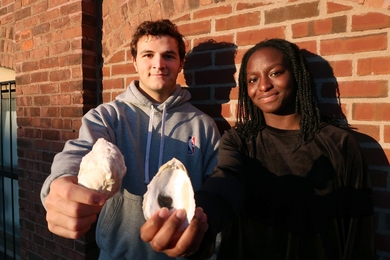A. Leon Higginbotham Jr., Chief Judge Emeritus of the United States Court of Appeals for the Third Circuit and Public Service Professor of Jurisprudence at Harvard University, will deliver the main address February 10 at the 21st annual MIT celebration of the life and legacy of Dr. Martin Luther King Jr.
He will speak in Kresge Auditorium shortly after noon, following the traditional silent march to Kresge from Lobby 7, where activities honoring Dr. King will begin in the morning. Earlier in the day, President and Mrs. Vest will host a welcoming breakfast for the keynote speaker that will be attended by students, faculty and senior leaders of the MIT community. Following the program in Kresge, there will be a reception in the Stratton Student Center where members of the community will have an opportunity to meet and speak with Professor Higginbotham. A full schedule of activities will be printed in a subsequent issue of Tech Talk.
Professor Higginbotham is the author of In the Matter of Color-Race and The American Legal Process: The Colonial Period, (Oxford University Press 1978), which received several national and international awards.
The introductory note to that volume is a quote from Frederick Douglass' reply of February 7, 1866, to President Andrew Johnson:
"Peace between races is not to be secured by degrading one race and exalting another, by giving power to one race and withholding it from another; but by maintaining a state of equal justice between all classes."
Professor Higginbotham addressed the racial justice issue recently in an op-ed article published December 1 in The Boston Globe under a headline reading, "Our `contract' with Rosa Parks." Professor Higginbotham, in an open letter to Rep. Newt Gingrich, wrote:
"As you and your Republican colleagues prepare to enforce or implement your contract with America, I trust that you will use your skills as a former history teacher to ponder the significance of Rosa Parks' protest in Montgomery, Ala., which took place 39 years ago. From the days that they arrived here in slave ships, African-Americans have often been skeptical about some of the contracts with America implemented by adroit politicians, statesmen and even the revered forefathers. Today, many African-Americans and other persons of good will are hoping that your `Contract With America' will not constitute a turning back in the denial of justice to the weak, the poor, the powerless and minorities."
Professor Higginbotham, who will mark his 67th birthday February 25, teaches in the Harvard Faculty of Arts and Science, the Law School and the John F. Kennedy School of Government. He has also taught as an adjunct professor at the law schools of Harvard, the University of Michigan, New York University, the University of Pennsylvania, Stanford and Yale Universities.
Until he retired March 5, 1993, he was Circuit Judge and Chief Judge of the United States Court of Appeals for the Third Circuit. He was appointed a district court judge in 1964 and a court of appeals judge in 1977.
It was in federal court in Philadelphia that the US Justice Department brought an antitrust action against MIT and Ivy League schools, alleging collusion in the awarding of financial aid-the "overlap case." Professor Higgin-botham, who had retired from the court when the action reached the appeals level, spoke in support of MIT's position as the lawyer for the school district of Philadelphia, one of several groups which filed briefs in the case, which was eventually settled to MIT's satisfaction.
A graduate of Antioch College (BA 1949) and Yale Law School (LLB 1952), he also was educated in the public schools of Trenton, NJ, and studied engineering at Purdue University in 1944 and 1945.
President Johnson appointed him vice chairman of the National Commission on the Causes and Prevention of Violence. Supreme Court Chief Justices Warren, Burger and Rehnquist appointed him to a variety of judicial conference committees and other related responsibilities. In 1962, President Kennedy named him to the Federal Trade Commission. He was the first black to be a member at the commission level of any federal regulatory agency, and the youngest person to be named an FTC commissioner.
He continues his association with the practice of law, being of counsel to Paul, Weiss, Rifkind, Warton & Garrison in the firm's New York and Washington offices.
A version of this article appeared in the December 7, 1994 issue of MIT Tech Talk (Volume 39, Number 14).





